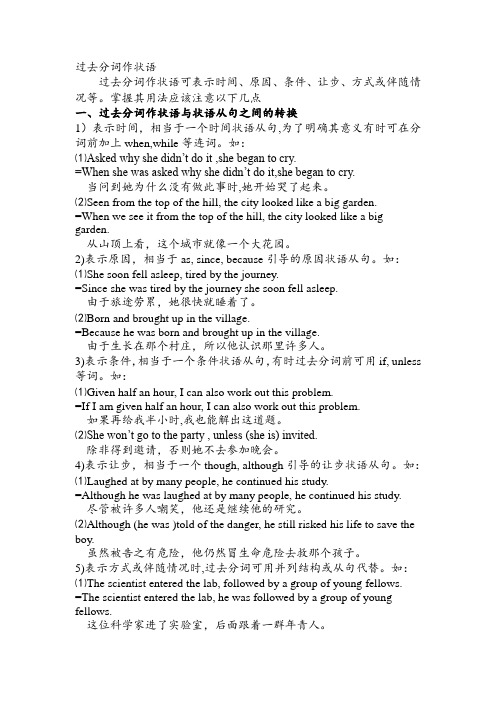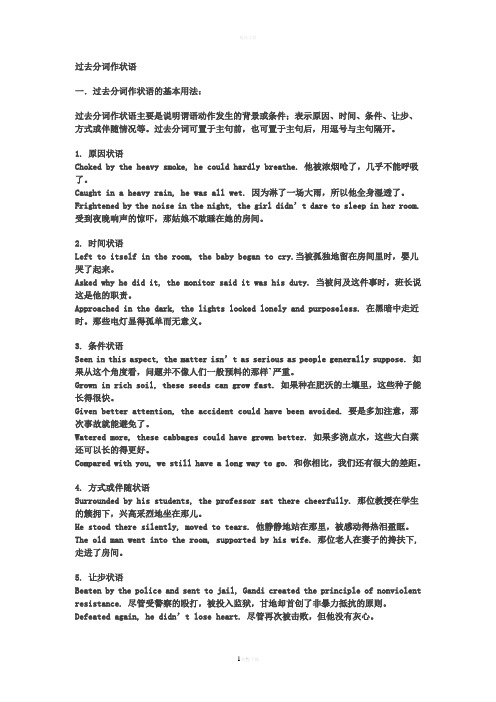过去分词作状语
过去分词作状语详解

过去分词作状语详解一.过去分词作状语的基本用法:过去分词作状语主要是说明谓语动作发生的背景或条件;表示原因、时间、条件、让步、方式或伴随情况等。
过去分词可置于主句前,也可置于主句后,用逗号与主句隔开。
例如:1. 原因状语Choked by the heavy smoke, he could hardly breathe. 他被浓烟呛了,几乎不能呼吸了。
Caught in a heavy rain, he was all wet. 因为淋了一场大雨,所以他全身湿透了。
Frightened by the noise in the night, the girl didn’t dare to sleep in her room. 受到夜晚响声的惊吓,那姑娘不敢睡在她的房间。
2. 时间状语Left to itself in the room, the baby began to cry.当被孤独地留在房间里时,婴儿哭了起来。
Asked why he did it, the monitor said it was his duty. 当被问及这件事时,班长说这是他的职责。
Approached in the dark, the lights looked lonely and purposeless. 在黑暗中走近时。
那些电灯显得孤单而无意义。
3. 条件状语Seen in this aspect, the matter isn’t as serious as people generally suppose.如果从这个角度看,问题并不像人们一般预料的那样`严重。
Grown in rich soil, these seeds can grow fast. 如果种在肥沃的土壤里,这些种子能长得很快。
Given better attention, the accident could have been avoided. 要是多加注意,那次事故就能避免了。
过去分词做状语

某些过去分词(短语)来源于系表结构,有些甚至具有形 容词的特征,因此,虽然它们作状语时与句子主语之间存 在逻辑意义上的主动关系,但仍然用它们的过去分词来作 状语。这类过去分词(短语)常见的主要有:caught in,
devoted to, disappointed at, determined to, dressed in, exhausted,hidden, lost in, prepared for, seated, tired of 等。 Caught in the heavy rain, Jennifer didn’t arrive on time. Disappointed at the examination results, the top student sat there in stony silence. Entirely devoted to the Party, the young soldier gave his life for his country.
√
looking "We can't go out in this weather," said Bob, ________
(look) out of the window. 过去分词与句子主语构成动宾关系(被动), 而现在分词 与句子主语构成主谓关系(主动)。
现在分词的时态和语态
主动形式 一 般 式 完 成 式 (not) doing 被动形式 (not) being done
(not) having been (not) having done done
1. Not knowing his address, I could do nothing but stay at home and wait. 2. Not having received his father’s letter, he decided to make a call to him. 3. Having been translated into many different languages, this book become well known all over the world.
过去分词作状语的用法归纳

过去分词作状语的用法归纳
1. 哎呀,当过去分词表示被动或完成的时候,就可以作状语啦!就像“He was deeply moved by the story.”这里的“moved”就是被故事深深打动呀。
2. 嘿,要是过去分词用来表达原因,那也是很妙的哟!比如说“Frustrated by the failure, he almost gave up.”这“Frustrated”不就是因为失败而沮丧嘛。
3. 哇塞,当过去分词表示时间,这多神奇呀!像“Seen from the top of the mountain, the view is amazing.”看到没,“Seen”就是从山顶被看到那个时间点呀。
4. 哟呵,过去分词表示条件的时候,是不是很有意思呀!例如“If prepared well, you will do great.”这里的“prepared”就是如果准备好这个条件呀。
5. 哈哈,过去分词还能表示让步呢!像“Though beaten many times, he still doesn't give up.”“beaten”就是尽管被打击很多次啦。
6. 哎呀呀,当表示方式或伴随的时候,过去分词也能上呀!比如“She sat there, lost in thought.”“lost”不就是那种伴随的状态嘛。
7. 嘿呀嘿呀,过去分词作状语的时候,可真是变化多端呢!就像“Surrounded by his friends, he feels happy.”“Surrounded”就是周围被朋友围着呀。
8. 哇哦,过去分词这么有用,大家可得好好掌握呀!
总之,过去分词作状语的用法很多,大家要多多练习,才能运用自如呀!。
过去分词作状语

动词-ing或过去分词作状语, 其逻辑 主语应是主句主语。
2. If ___ the same treatment again, he’s sure to get well. A. giving B. give C. given D. being given
3. _____ in 1636, Harvard is one of the
A. followed C. to be followed
B. following D. being followed
3. The next morning she found the man _A__ in bed, dead.
A. lying C. lay
B. lie D. laying
4. I can hardly imagine Peter _B__ across the Atlantic Ocean in five days.
A. are bought B. bought C. been bought D. buying
( D)14. Don’t use words, expressions, or phrases ________ only to people with specific knowledge. A. being known B. having been known C. to be known D. known
高考链接
(A)1. _______ more attention, the tree
could have grown better.
A. Given B. To give
C. Giving D. Having given.
(D)2. The computer center, ________ last
过去分词作状语的用法

过去分词作状语(The Past Participle used as Adverbial) 一、过去分词作状语的一般用法1. 过去分词作状语,可以表示时间,原因,条件,让步及伴随情况等。
过去分词作状语,可以表示时间,原因,条件,让步及伴随情况等。
过去分词作状语,其逻辑主语必须和句子主语保持一致,并且必须是被动关系。
过去分词作状语,其逻辑主语必须和句子主语保持一致,并且必须是被动关系。
Asked how he broke into the room, he made no answer. (当有人问他怎么闯进屋里来,他一声不吭。
)_________________________________ When heated ,water will be turned into steam. 水加热后会变成蒸汽。
(表示时间)(表示时间) ___________________________________ Deeply moved by the film , we all cried. 由于被电影深深打动,我们都哭了。
(表示原因)___________________________________ Born into a poor family , he had no more than two years of schooling. 出生于贫苦家庭,他只上了两年学。
___________________________________ Given more help, we could have done the work better. 如果给我们的帮助多一些,我们本来能做的更好。
(条件)___________________________________ Though frightened by the big fire , he stood out bravely. 尽管害怕大火,可他还是勇敢地站了起来。
过去分词作状语

(Because he was caught in a heavy rain)
表示条件,相当于 表示条件 相当于if, unless引导的条件状语 相当于 引导的条件状语 从句
如果种在肥沃的土壤里,这些种子能长得很快。 如果种在肥沃的土壤里,这些种子能长得很快。
7. Unless ___ to speak, you should remain silent at the conference. A. invited C. being invited B. inviting D. having invited
8. When _____, the museum will be open to the public next year. A. completed B. completing C. being completed D. to be completed 析:正确答案为 A 项。博物馆是被完 工的, 工的 所以该空应填过去分词 completed 作状语。 作状语。
过去分词作状语
过去分词在句中一般能作时间、原因、 过去分词在句中一般能作时间、原因、 时间 条件、让步和方式状语。 条件、让步和方式状语。如: 表示原因,相当于由as, since, 或because 表示原因,相当于由 引导的原因状语从句
Caught in a heavy rain, he was all wet.
4._______ (give) more time, I’ll finish my Given work on time. 5. Compared with _________ (develop) developed countries, we still have a long way to go. 6. The English teacher entered the room, _________ (folቤተ መጻሕፍቲ ባይዱow) by his students. followed
过去分词作状语

过去分词作状语过去分词作状语可表示时间、原因、条件、让步、方式或伴随情况等。
掌握其用法应该注意以下几点一、过去分词作状语与状语从句之间的转换1)表示时间,相当于一个时间状语从句,为了明确其意义有时可在分词前加上when,while等连词。
如:⑴Asked why she didn’t do it ,she began to cry.=When she was asked why she didn’t do it,she began to cry.当问到她为什么没有做此事时,她开始哭了起来。
⑵Seen from the top of the hill, the city looked like a big garden.=When we see it from the top of the hill, the city looked like a big garden.从山顶上看,这个城市就像一个大花园。
2)表示原因,相当于as, since, because引导的原因状语从句。
如:⑴She soon fell asleep, tired by the journey.=Since she was tired by the journey she soon fell asleep.由于旅途劳累,她很快就睡着了。
⑵Born and brought up in the village.=Because he was born and brought up in the village.由于生长在那个村庄,所以他认识那里许多人。
3)表示条件,相当于一个条件状语从句,有时过去分词前可用if, unless 等词。
如:⑴Given half an hour, I can also work out this problem.=If I am given half an hour, I can also work out this problem.如果再给我半小时,我也能解出这道题。
过去分词作状语的用法归纳

过去分词作状语一.过去分词作状语的基本用法:过去分词作状语主要是说明谓语动作发生的背景或条件;表示原因、时间、条件、让步、方式或伴随情况等。
过去分词可置于主句前,也可置于主句后,用逗号与主句隔开。
1. 原因状语Choked by the heavy smoke, he could hardly breathe. 他被浓烟呛了,几乎不能呼吸了。
Caught in a heavy rain, he was all wet. 因为淋了一场大雨,所以他全身湿透了。
Frightened by the noise in the night, the girl didn’t dare to sleep in her room. 受到夜晚响声的惊吓,那姑娘不敢睡在她的房间。
2. 时间状语Left to itself in the room, the baby began to cry.当被孤独地留在房间里时,婴儿哭了起来。
Asked why he did it, the monitor said it was his duty. 当被问及这件事时,班长说这是他的职责。
Approached in the dark, the lights looked lonely and purposeless. 在黑暗中走近时。
那些电灯显得孤单而无意义。
3. 条件状语Seen in this aspect, the matter isn’t as serious as people generally suppose. 如果从这个角度看,问题并不像人们一般预料的那样`严重。
Grown in rich soil, these seeds can grow fast. 如果种在肥沃的土壤里,这些种子能长得很快。
Given better attention, the accident could have been avoided. 要是多加注意,那次事故就能避免了。
- 1、下载文档前请自行甄别文档内容的完整性,平台不提供额外的编辑、内容补充、找答案等附加服务。
- 2、"仅部分预览"的文档,不可在线预览部分如存在完整性等问题,可反馈申请退款(可完整预览的文档不适用该条件!)。
- 3、如文档侵犯您的权益,请联系客服反馈,我们会尽快为您处理(人工客服工作时间:9:00-18:30)。
THANKS
2.(She was) Dressed in white, (and) she looked really pretty.
穿着白衣服,她看起来确实很美。
过去分词表完成、被动,与主句的主语之间是被动关系。 现在分词表进行、主动,与主句的主语之间是主动关系。
Following the old man, we went upstairs. = We followed the old man, and we went upstairs. Followed by the old man, we went upstairs. = We were followed by the old man, and we went upstairs.
过去分词作原因状语时,相当于一个由as, since,
because等词引导的原因状语从句。
1. (Because they were) Moved by the movie, the children
began to cry. 由于被电影深深地感动,孩子们哭了起来。
2. Frightened (Because she was frightened) by the horror
过去分词作状语
过去分词作时间状语时,相当于一个时间状语从句。 有时过去分词前可加连词when或while来强调时间概念.
1. Asked (When he was asked) what had happened, his face
turned red. 当他被问及发生了什么的时候,他的脸红了。 2. When heated (When it is heated), water changes into steam. 当加热时,水变成水蒸气。
movie, the girl didn't dare to sleep alone. 因为被惊悚电影吓
坏了,这个女孩不敢单独睡觉。
过去分词作条件状语时,通常放在句子的前面,相当于 if, unless等引导的条件状语从句。
1.Given more time (we would
can't understand it. 即使给他解释一百篇,他还是不会明白。
过去分词作状语表方式或伴随状语时不用状语从句替换, 但可以改写成并列句。
1.She walked out of the house, (and she was) followed by
her little daughter.她走出房子,后面跟着她小女儿。
1. Left (Although he was left) at home, John didn't feel afraid
at all.虽然John被单独留在房间里, 他一点都不害怕。
2. (Although he was) Explained a hundred times , he still
be able to do the work much better.
2.Given a few minutes (If I am given a few minutes), I’ll
finish it. 再给几分钟的时间,我就会完成了
过去分词作让步状语时,相当于一个以though / although引导的让步状语从句,这类一般放在句子前面
